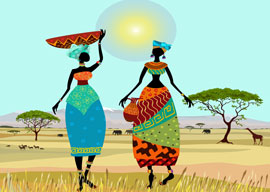
April 30, 2014

Source: Shutterstock
But Wade has no time for scientists” personal idiosyncrasies. He’s interested in not just explaining the solid science of race, but in also sketching out a more speculative theory of how history has been driven by racial differences in evolution:
Though there is still a large random element, the broad general theme of human history is that each race has developed the institutions appropriate to secure survival in its particular environment.
He notes:
The view of economic development generally taken by economists is that people have little or nothing to do with it. Since all humans are identical units that respond the same way to incentives, at least in economic theory, then if one country is poor and another rich, the differences cannot have anything to do with the people but must lie in institutions or access to resources.
Thus:
On the basis of this theory, the West has spent some $2.3 trillion in aid over the last 50 years without managing to improve African living standards. Could something be not quite right with the theory?
Extrapolating from Clark’s 2007 book A Farewell to Alms, which argued for the evolutionary benefits to Eurasians of being selected for fitness to survive in densely populated or otherwise difficult regions, Wade observes:
African populations have not gone through the same Malthusian wringer that shaped the behavior of the European and East Asian populations. Between 1200 and 1800, the English, adapting to the harsh pressures of an intense agrarian economy, became less violent, more literate and more willing to save for the future. In Africa, population pressure has long been much lower than in Europe and Asia …
European cultures tried to keep population below the famine level by inculcating the sexual restraint and romantic choosiness conducive to relatively late marriages, while East Asian cultures cultivated grinding work ethics. In most of tropical Africa, however, the infectious disease burden was so lethal that dense populations could not be achieved due to epidemics. So the population could not form cities, nor even fully farm the countryside. The big danger in Africa was not Malthusian overpopulation, but underpopulation, which may account for how sexualized their cultures are.
Not surprisingly, each continent’s culture seems to have bred people befitting its environment, and their traits live on in their descendants in modern America.
Wade ends with an injunction that may seem familiar:
Knowledge is usually considered a better basis for policy than ignorance.